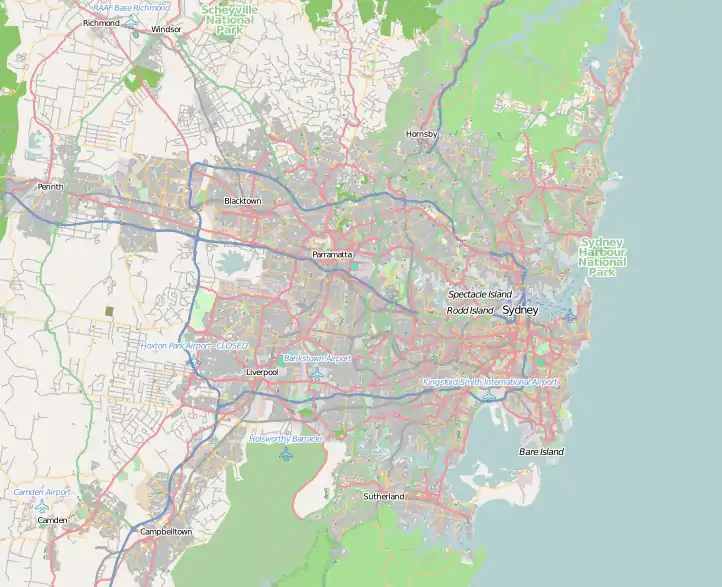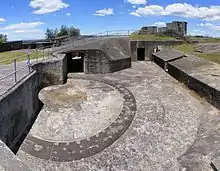| Middle Head Fortifications | |
|---|---|
 Gun emplacements | |
| Location | Middle Head Road, Middle Head, Mosman, Mosman Council, New South Wales, Australia |
| Coordinates | 33°49′38″S 151°16′05″E / 33.8272°S 151.2680°E |
| Built | 1801–1942 |
| Architect | James Barnet |
| Owner | NSW Office of Environment and Heritage |
| Official name | Chowder Bay Barracks Group, Chowder Bay Rd, Georges Heights, NSW, Australia |
| Type | Listed place |
| Designated | 22 June 2004 |
| Reference no. | 105254 |
| Class | Historic |
| Place File No | 1/13/026/0008 |
| Official name | Middle Head Military Fortifications; Middle Head Fortifications; The Old Fort |
| Type | State heritage (complex / group) |
| Designated | 2 April 1999 |
| Reference no. | 999 |
| Type | Fortification |
| Category | Defence |
 Location of Middle Head Fortifications in Sydney | |
The Middle Head Fortifications is a heritage-listed former defence establishment and military fortifications and now public space located at Middle Head Road, Middle Head, Mosman in the Mosman Council local government area of New South Wales, Australia. It is also known as the Middle Head Military Fortifications or The Old Fort. The fortifications consist of the Outer Middle Head Battery located at the end of Old Fort Road, the Inner Middle Head Battery located at the end of Governors Road, and the Obelisk batteries reached by a path from the corner of Middle Head Road and Chowder Bay Road. The fortifications at Middle Head formed part of Sydney Harbour's defences. The property is owned by the Department of Planning and Environment. It was added to the New South Wales State Heritage Register on 2 April 1999.[1]
History
The first fort at Middle Head was built in 1801 and the last batteries were constructed in 1942. The majority of the fortifications were built between 1870 and 1911. The site contains the works of several periods and technologies, which remain in place for review today. Historically it dates from the time when defence was first moved away from Sydney Cove and towards The Heads.[2]
There were three sets of fortifications built in Mosman and Middle Head in the 1870s, these were upgraded in the 1880s on the advice of British experts. These fortifications still exist and are now heritage listed, they are, the Lower Georges Heights Commanding Position, the Georges Head Battery and a smaller fort located on Bradleys Head, known as the Bradleys Head Fortification Complex.
The battery on Middle Head built in 1871 was designed by James Barnet, a colonial architect. The fort was built on a strategic location and received many additions until 1911. It formed part of a network of 'outer harbour' defences. They were designed to fire at enemy ships as they attempted entry through the Sydney Heads. The whole area is linked by an extensive network of tunnels, ancillary rooms, gunpowder magazine and a disappearing gun emplacement. The site has its own underground power room that is supported by iron columns. Rooms located below ground were used to train some of Australia's first troops who were sent to Vietnam in 'Code of Conduct' courses, which were lessons in how to withstand torture and interrogation, by simulating prisoner of war conditions.[3]
In 1974 the Middle Head fortifications featured in the movie Stone.
In 1979 most of the area became national park and the military has moved on to more strategic locations. The army base on site which included the transport group and 30 Terminal Squadron, left Georges Height's in 1997. The Headquarters Training Command section relocated to the Victoria Barracks in 2002.[4]
The Officers Quarters
The Officers quarters is a Victorian Regency style building that was built on a rough stone base. It was designed by Colonial Architect James Barnet and is considered to be one of the most significant buildings at Middle Head. The site incorporates a defensive ditch or moat and includes a fortification wall. The house looking in the direction of Middle Harbour meant that it could be used for surveillance purposes as well.
One former resident was Major General Sir William Throsby Bridges KCB, CMG, the first commander of the First Australian Imperial Force and the commander of Australian forces in the Gallipoli Campaign. Throsby Bridges was killed by a sniper whilst leading the forces at Gallipoli. His warhorse Sandy was brought back to Australia, seeing out its days in Victoria.
Primarily used as a residence this building originally housed two officers separately, a senior and junior officer. During World War II this building served as a Red Cross Hospital and later as accommodation for the Australian Women's Army Service. The house continues to be used as a residence.[5]
Restoration
Extensive restoration work has been conducted by the Sydney Harbour Federation Trust which has revived many of the old buildings.
The sites facilities include:
- Former military hospital buildings
- Former Officers' mess
- Former barracks converted to the School of Pacific Administration
- Former 10 Terminal Transport Depot, later the Army School of Intelligence
- 30 Terminal Transport Depot
- Former Submarine Miners' Depot, later Army Maritime School
- Wharf, jetty
- Training facilities
- Fortifications systems
- Depots, barracks, mess halls
- Residential accommodation
- Ovals
Heritage listing
Middle Head Military Fortifications was listed on the New South Wales State Heritage Register on 2 April 1999[1] and in 2004 the Chowder Bay Barracks Group, including the Georges Head Battery, was inscribed on the Commonwealth Heritage List.[6]
Gallery
 RML gun being removed in 1891
RML gun being removed in 1891 Inside the underground fortress tunnel network
Inside the underground fortress tunnel network
 An underground power room supported by iron columns that was used to train some of Australia's first troops that were sent to Vietnam in 'Code of Conduct' courses with tigers cages pictured on the left and gun emplacements
An underground power room supported by iron columns that was used to train some of Australia's first troops that were sent to Vietnam in 'Code of Conduct' courses with tigers cages pictured on the left and gun emplacements
 RML 10 inch gun being dismantled at the fortification in 1893 and the remains of a former depression range finding station
RML 10 inch gun being dismantled at the fortification in 1893 and the remains of a former depression range finding station A side view of the officers quarters with fortified wall in view
A side view of the officers quarters with fortified wall in view Gunners Barracks, Middle Head, Sydney
Gunners Barracks, Middle Head, Sydney Gunners Barracks, tactically situated into the hillside so as not to be visible from the water. The barracks buildings were constructed from sandstone excavated onsite.
Gunners Barracks, tactically situated into the hillside so as not to be visible from the water. The barracks buildings were constructed from sandstone excavated onsite.
See also
References
- 1 2 "Middle Head Military Fortifications". New South Wales State Heritage Register. Department of Planning & Environment. H00999. Retrieved 2 June 2018.
 Text is licensed by State of New South Wales (Department of Planning and Environment) under CC-BY 4.0 licence.
Text is licensed by State of New South Wales (Department of Planning and Environment) under CC-BY 4.0 licence. - ↑ "Middle Head Fortifications, Old Fort Rd, Georges Heights, NSW, Australia (Place ID 2872)". Australian Heritage Database. Australian Government. Retrieved 10 August 2018.
- ↑ Cities of the Underworld - Alcatraz Down Under - Middle Head Fortification - 4/5. 26 February 2009. Archived from the original on 21 December 2021. Retrieved 4 May 2016 – via YouTube.
- ↑ Sydney Harbour Federation Trust Sites – Headland Park Archived 2007-11-07 at the Wayback Machine
- ↑ "Plaque found on site, Middle Head". Department of Environment and Conservation New South Wales.
- ↑ "Chowder Bay Barracks Group, Chowder Bay Rd, Georges Heights, NSW, Australia (Place ID 105254)". Australian Heritage Database. Australian Government. Retrieved 10 August 2018.
Bibliography
- Attraction Homepage (2007). "Middle Head Military Fortifications".
- Attraction Homepage (2007). "Middle Head Military Fortifications".
- Attraction Homepage. "Middle Head Guided Tour".
- Paul Davies P/L (2005). Conservation Management Plan: Sydney Harbour National Park Middle Head Historic Buildings.
- Sydney Harbour Federation Trust (2007). Management plan - Mosman No.7 : Middle Head.
- National Parks & Wildlife Service. National Parks & Wildlife Service Section 170 Register.
Attribution
![]() This Wikipedia article contains material from Middle Head Military Fortifications, entry number 00999 in the New South Wales State Heritage Register published by the State of New South Wales (Department of Planning and Environment) 2018 under CC-BY 4.0 licence, accessed on 2 June 2018.
This Wikipedia article contains material from Middle Head Military Fortifications, entry number 00999 in the New South Wales State Heritage Register published by the State of New South Wales (Department of Planning and Environment) 2018 under CC-BY 4.0 licence, accessed on 2 June 2018.